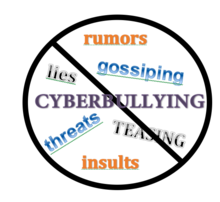Digital citizenship
Digital citizenship is a term one doesn’t hear as much as expected in the educational environment. Students, parents, even teachers seem to assume that all those using technology have the needed skills and understanding to use digital devices responsibly. Digital citizenship is not given the proper focus in education.
1. Digital Access
Access to technology is not equally available to all. In the educational setting, it is important to understand this. By not ensuring technology available to all students, an imbalance in educational opportunity occurs. Technology leaders should strive to provide the necessary resources for all students to be given equal learning opportunities.
2. Digital Commerce – Buying and selling goods and services via the internet is now as common as buying and selling in a physical space. Buyers and sellers should be ever mindful of the legalities of both purchasing items as well as selling items. Being an informed consumer is vital in the digital market.
3. Digital Communication – Communicating is now anywhere, anytime, through multiple means including instant messaging, social media, Skype, text messaging, cell phone, and e-mail. Given so many choices, digital users must be taught appropriate communication skills. Students, teachers, parents, town hall members should understand the importance of effective, respective communication skills.
4. Digital Literacy – Technology advances rapidly. There are significant changes in technology occurring almost daily. Because of this, technology users must be cognizant of changes and willing to explore new resources. In addition, many times in the educational setting, students are not taught how to properly use new technology. Even advanced users of technology need to be taught how to use technology that is new to them.
5. Digital Etiquette – Appropriate/ proper online conduct. Every person using technology should adhere to the basic principle of “treat others how you would like to be treated”. Respect for others and respect for oneself should be guiding principles in any online communication with others.
6. Digital Law – These things are a crime: stealing of any kind-identity, other’s work, or property (Ribble, 2017). And this applies to any technology user whether playing games or working online (Ribble, 2017).
7. Digital Rights and Responsibilities – With personal digital communications come individual rights. With these rights come responsibilities. Online community members have the right to free speech and communication, but these rights must not interfere with the rights of others. It is each person’s responsibility to be respectful of the rights of others.
8. Digital Health and Wellness – Technology users need to be aware of the physical and emotional effects of using digital devices. There could be unforeseen and dangerous. Understanding the possible side-effects of technology use, consumers should educate themselves in the responsible use of technology.
9. Digital Security – Technology users should monitor and protect their personal identity and information continuously. Predators are ever present in the online community so all digital users should be constantly aware of what and how personal information is being shared.
Cyberbullying
 | ||
| Stop Cyberbullying |

Cyberbullying is bullying that takes place over digital devices like cell phones, computers, and tablets. Cyberbullying can occur through SMS, Text, and apps, or online in social media, forums, or gaming where people can view, participate in, or share content.
Cyberbullying is bullying that’s done through the use of technology, for example, using the internet or a mobile phone to hurt, harass or embarrass someone.
It includes sending, posting, or sharing negative, harmful, false, or mean content about someone else. It can include sharing personal or private information about someone else causing embarrassment or humiliation. Some cyberbullying crosses the line into unlawful or criminal behavior as well.
Types of cyberbullying
Harassment - This is a dangerous act of sending offensive, rude, and insulting messages and being abusive. Nasty or humiliating comments on posts, photos and in chat rooms. It can have serious implications for your child’s wellbeing. The messages are generally unkind or malicious, can impact their self-esteem and confidence, and can make them fearful.
Outing
The outing is a deliberate act to embarrass or publicly humiliate your child or a group through the online posting of sensitive, private or embarrassing information without their consent.Cyberstalking
Refer to the practice of adults using the Internet to contact and attempt to meet with young people for sexual purposes.
Fake Profiles
Fake profiles can be created in order for a person to hide their real identity with the intention of cyberbullying your childTrickery –The cyberbully will ‘befriend’ your child and lead them into a false sense of security before breaking their trust. This is when someone may share personal information about another or trick someone into revealing secrets and forward it to others. They may also do this with private images and videos too.
Trolling
Tolling is the deliberate act of provoking a response through the use of insults or bad language on online forums and social networking sites.Catfishing
A catfish is someone who wants to hide who they are. They will look at your child’s social networking profile and take any information they want to create a fake persona.
How can cyberbullying affect you?
It makes you feel guilty like it’s your fault or a mistake.
- losing self-esteem or belittling oneself
- getting into depression and rejected by society
- unsafe and afraid and scared to go to school
- stressed-out wondering what to do and why this is happening to you.
- Feel exposed and humiliated.
- Feel disinterested in life.

:max_bytes(150000):strip_icc()/what-are-the-effects-of-cyberbullying-460558_color1-5b50c42946e0fb0037b84d00.png)
No comments:
Post a Comment